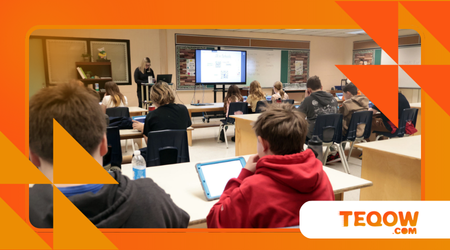How AI & Generative Tech are Shaping Teaching & Learning in Canadian Schools

AI & Generative Tech are Shaping Teaching & Learning across Canada, fundamentally redefining the dynamics within our classrooms in 2025.
This technological wave is not just an upgrade; it’s a systemic transformation challenging traditional pedagogical models and administrative structures.
Canadian educators and policymakers are currently navigating a complex landscape where innovation meets genuine ethical and privacy concerns.
The rapid integration of sophisticated tools from adaptive tutoring systems to generative text models demands an urgent, unified national strategy.
We must ensure these powerful technologies are harnessed responsibly to enhance, rather than erode, the foundational goals of a high-quality Canadian education.
This requires immediate collaboration between school boards, government, and technology developers.
What is the Immediate Impact of AI on the Canadian Classroom Experience?
The most immediate and tangible impact of AI & Generative Tech are Shaping Teaching & Learning lies in the area of personalized learning.
AI algorithms can analyze student performance data in real-time, identifying specific knowledge gaps or areas for enrichment far faster than any single teacher could.
This allows AI-driven platforms to offer tailored learning paths, adjusting content difficulty and pace to suit each student’s unique needs and learning style.
For instance, a student struggling with algebra receives immediate, scaffolded practice problems generated by the AI, ensuring they master the concept before moving on.
++ Lifelong Learning: Best Programs in Canada for Adult Education & Upskilling
How Does AI Enhance Personalization for Students?
Personalized AI-powered systems function like infinitely patient, custom-built tutors for every student.
This dynamic adjustment ensures that no student is left behind, nor is any student held back by the collective pace of the class.
In an original, practical application, a new AI system in development at a major Ontario school board generates diverse essay prompts based on a student’s interests while focusing on a specific curriculum objective, fostering engagement and demonstrating concept mastery simultaneously.
The customization extends beyond content to the format itself, adapting materials for visual, auditory, or kinesthetic learners.
This level of granular, tailored instruction directly addresses the diversity inherent in Canadian classrooms, promoting true inclusion.
Also read: Comparing K-12 Education Across Provinces: What’s Different Between Ontario, Quebec & Alberta
What are the Benefits of AI for Educators’ Workload?
AI & Generative Tech are Shaping Teaching & Learning by offering teachers a powerful reprieve from the time-consuming burdens of administrative and assessment tasks.
This is perhaps the most celebrated immediate benefit by educators across the country.
Automated grading of quizzes, objective tests, and initial assignment drafts by AI tools frees up several hours per week for teachers.
This reclaimed time can be strategically redirected toward high-value activities, such as one-on-one student mentoring, complex lesson design, and professional development.
Read more: Scholarships & Grants Every Student in Canada Should Explore
How Can Generative AI Tools Streamline Teacher Workflow?
Generative AI, like Large Language Models (LLMs), is proving invaluable in rapidly creating custom instructional materials.
Teachers use these tools to generate varied practice worksheets, draft communication emails to parents, or summarize complex research articles for class use.
The ability to instantly create differentiated content is a significant game-changer.
An instructor can input a lesson objective and instantly receive three versions of an assignment suitable for different readiness levels within minutes, a task that previously took hours of manual preparation.

How is AI Redefining Academic Integrity and Assessment?
The ubiquitous availability of generative tools poses a severe, immediate challenge to traditional academic integrity models.
If students can generate a competent essay in seconds, how do we accurately assess their genuine comprehension and critical thinking skills?
Canadian school boards are quickly transitioning assessments away from final product focus to a process-based evaluation.
The emphasis is now shifting to the iterative steps, evidence of drafting, and the student’s ability to use the AI tool as a collaborator, not a replacement.
Why is AI Literacy Crucial for Modern Students?
The debate is no longer about if students should use AI, but how they should use it ethically and effectively.
AI literacy is rapidly becoming a core 21st-century skill, equally important as traditional reading or digital skills. The Aesthetics of Slow Cinema wait, wrong article!
The analogy here is that mastering AI is like learning to drive a powerful new vehicle: the skill isn’t in starting the engine (generating content), but in navigating complex traffic safely and strategically to reach a specific destination (solving a problem).
The Evolving Role of Canadian Education Policy
Canada’s federated system means AI policy is decentralized, with provinces and school boards taking the lead, though the Federal government has offered risk-based guidance.
This decentralized approach creates a patchwork of regulations across the country.
Many boards are moving toward transparent policies that require students to cite AI usage and teachers to employ privacy-vetted, board-approved tools.
The goal is governing the technology responsibly, prioritizing student data security above all else.
What Ethical and Equity Challenges Does AI Pose to Canadian Schools?

The expansion of AI & Generative Tech are Shaping Teaching & Learning must be managed with a critical eye toward equity.
Unequal access to the best AI tools, professional development, and fast internet connections threatens to widen the existing digital divide.
Algorithmic bias is another critical concern: if AI models are trained on flawed or unrepresentative data, their outputs may inadvertently reinforce existing prejudices or disadvantage specific demographic groups.
Vetting AI systems for fairness and transparency is essential for the Canadian public education system.
The Importance of Teacher Training and Digital Fluency
The successful integration of AI is entirely dependent on the confidence and competence of Canadian educators.
Teachers require robust, ongoing professional development that shifts their role from content delivery expert to a facilitator of AI-enhanced learning.
School boards must invest heavily in training that teaches teachers how to leverage AI to personalize instruction while monitoring for misuse and bias.
This critical professional support needs to be standardized across the country, not left to individual discretion.
Key Statistic on Canadian Student AI Usage (2025)
According to the KPMG Generative AI Adoption Index Survey released in October 2025, a significant 73 per cent of Canadian students across high school and post-secondary levels reported using generative AI for their schoolwork.
Of those users, 66 per cent indicated that while they achieve better results, they do not feel they are learning or retaining as much knowledge a clear dilemma for educators.
| AI Impact Area | Key Benefit | Major Challenge | Policy Focus (2025) |
| Instruction | Personalized Learning Paths | Algorithmic Bias/Equity | Data Privacy & Vetting Tools |
| Assessment | Automated Grading/Feedback | Academic Integrity/Cheating | Process-Based Evaluation |
| Teacher Workflow | Reduced Administrative Load | Need for Extensive Training | Clear Usage Guidelines |
| Student Skills | Idea Generation/Efficiency | Critical Thinking Erosion | AI Literacy Curriculum |
AI & Generative Tech are Shaping Teaching & Learning in Canada, presenting a watershed moment for education policy and practice.
The undeniable power of these tools to personalize learning and liberate teacher time offers immense potential to address perennial challenges like student engagement and educational equity.
However, this power must be wielded carefully, demanding clear policies on data privacy, an aggressive commitment to AI literacy for all students, and substantial investment in teacher training.
We must govern this technology before it governs us. By taking a thoughtful, ethically-grounded approach now, Canada can ensure AI becomes a powerful catalyst for a stronger, more equitable future for all our students.
Share your thoughts: What is the single most important AI policy your local school board should implement immediately?
Frequently Asked Questions
Are Canadian school boards banning Generative AI tools like ChatGPT?
No. Initially, some jurisdictions restricted access, but the trend in 2025 is shifting away from outright bans toward governance.
Most Canadian school boards are now focusing on establishing acceptable use policies, training students in ethical AI use, and changing assessment methods.
What is ‘Algorithmic Bias’ and why does it matter in education?
Algorithmic bias occurs when an AI system produces results that are systematically unfair due to flaws in the data it was trained on.
In education, this could lead an AI tutor to unfairly grade or recommend different learning paths based on a student’s demographics, making it a critical equity issue.
How does AI personalization benefit students with learning disabilities?
AI tools provide unprecedented levels of immediate, adaptive support.
They can offer real-time transcription, text-to-speech, simplified language summaries, and adjusted pacing, all of which are crucial accommodations that can be instantly delivered to students with diverse learning needs, promoting greater inclusion.
Will AI replace teachers in Canadian classrooms?
Experts overwhelmingly agree that AI will not replace teachers, but rather augment their abilities.
AI handles repetitive tasks and data analysis; the human teacher remains essential for fostering creativity, empathy, mentorship, critical thinking development, and providing the vital emotional and social guidance students need.
